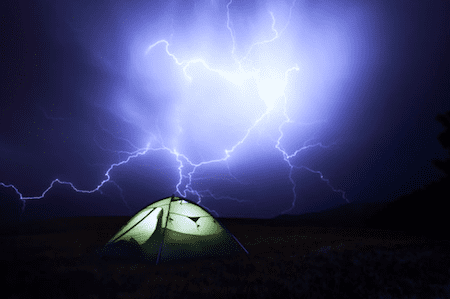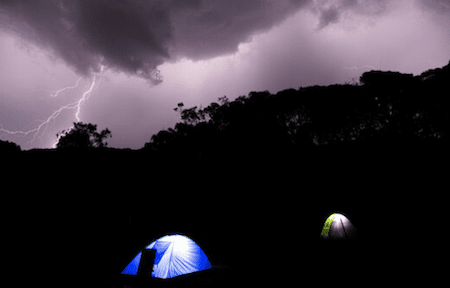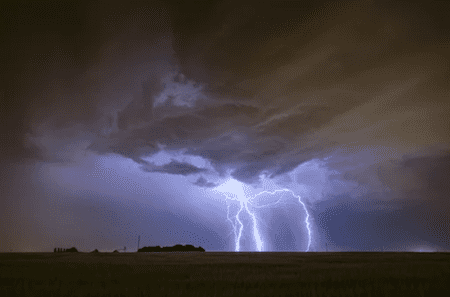If you’re an avid outdoorsman, chances are you don’t give much thought to the fact that a thunderstorm could leave you stranded inside your tent.
But picture this—you’re camping in the middle of nowhere. It’s dark, and you’ve crawled into your tent to get some sleep. The day was nice, but suddenly you hear thunderstorms in the distance.
Ten minutes later, it’s closer. Five minutes after that, it’s all around you. A thunderstorm has enveloped you out of the blue, leaving you wondering—what to do if stuck in tent during thunderstorm?
Your tent won’t provide any additional protection. But lucky for you, there are a handful of ways to keep yourself safe if you get trapped in your tent in a storm!
Let’s explain further.
Is It Safe To Stay In A Tent During A Thunderstorm?
Some campers will tell you it’s safe to stay in a tent during a thunderstorm and others say it’s unsafe.
What they won’t tell you is that it depends on your location, what type of tent you have, and whether or not there are trees nearby.
Being struck by lightning during a thunderstorm is not impossible, however. The chances of getting struck by lightning are higher in certain areas.
And setting up camp on an open field with tent poles literally beckoning the lightning is not conducive to avoiding it.
Further, there may be no way to tell whether a lightning strike will kill you, but you can be affected by the following:
-
Widow-Maker Trees
These trees can potentially cause you to die if they fall on your tent. Never pitch your tent under dead or weak branches!
-
Blown Away Tent
Not all tents are aerodynamic. Those tents can be blown away like kites by the wind, even with you inside.
-
Drenching
Getting soaked doesn’t usually pose a problem. But if you get wet through your clothing and equipment, you might suffer hypothermia.
So, let’s cut through some of that advice so you can know for sure if staying in a tent during a thunderstorm is safe for you.
Use our guide below, but remember: we’re better off with a better safe than sorry approach when it comes to storm safety.
Always assume dangerous situations can be far worse than they might appear!
How To Stay Safe When Stuck In A Tent During A Thunderstorm
It can be a frightening experience to be stuck in a tent during a thunderstorm. It can get horrible with lighting, thunder, and wind if you have no place to hide and are stuck in the middle of nowhere.
While there are no guarantees that you will be safe, here are some tips for staying safe when stuck in a tent during a thunderstorm.
Remain Calm
“The first thing you need to do is remain calm; your survival depends on it. If you panic, you could make the situation worse. You need to keep yourself focused on surviving the storm and making it through alive,” says Geremy Yamamoto, founder of Eazy House Sale.
“Of course, your first thought may be to run, but that’s not the best idea since one strike of lightning would easily kill you,” he explained.
Stay Inside Your Tent
Geremy also suggests to say inside tent during the storm. Most people know that tents aren’t safe during extreme weather events, including thunderstorms. However, they think they will be safer outside their tents than inside them. The truth is that this belief couldn’t be further from the reality of the situation.
“If you’re stuck in your tent during a storm, you must stay there because it will protect you from lightning which strikes at random places throughout an area and kills anyone who happens to be standing in its way,” says Geremy.
Get To The Center Of Your Tent
The first thing you want to do after deciding to stay inside is to get to the center of your tent.
When lightning strikes, it could hit one of the poles on your tent and travel through it, so try to stay away from them if possible.
If there’s no way to get near the center (like if your tent has a pole inside its center), try to stay as far away from the poles as possible and make sure no part of your body is touching them.
Put Something Between You And The Ground
“The best way to keep from being hit by lightning is to stay out of its path. Lightning often strikes the tallest object in an area, so don’t be that object,” says Patricia Diehl Madeira, chief executive officer of StormGeo.
She also suggest to avoid open spaces, high ground, and tall trees, if you are caught outside in a thunderstorm.
Lie Flat On Your Stomach (Or Squat)
Patricia adds “during a lightning storm, the best position to assume is on your stomach with your hands over your ears and as close to the ground as possible.”
“As a result, you become a smaller target for lightning and protected from any potential shock waves or debris from a nearby strike,” she explained.
If lying flat isn’t an option, crouching down on the balls of your feet will help protect you as well. The goal is to minimize contact with the ground and make yourself as small as possible.
If you’re alone, cover your ears with your hands to reduce hearing damage from thunder, which can be as loud as a jet engine.
Stay Away From Your Tent Mates
You and your tent mates are lightning rods. Remember that a lightning strike won’t have just one point of contact; the charge will spread across anything in the area.
So, if your tent has four people in it and lightning hits it, everyone will get shocked.
The solution? If you can’t avoid being outside during a storm, keep your tent mates at least six feet away.
This way, if lightning strikes you or anyone else, the other people in your tent won’t get electrocuted.
Do Your Best To Stay Warm And Dry
Take off any wet clothes and put on something dry like sweatpants, sweatshirts, and socks. If you don’t have dry clothes, wrap yourself in blankets or sleeping bags until the storm passes.
Damp clothing conducts electricity, so changing into dry clothes will help prevent electric shock if lightning strikes nearby.
Avoid Contact With Metal
Metal conducts electricity, so don’t use any metal objects inside the tent or near it during a thunderstorm — this includes things like knives, forks, and other cooking utensils.
Also, avoid using lights with metal fixtures or cords during the storm because they can conduct electricity and cause injury or death to anyone holding them at the time of contact with electricity.
If you have a camera tripod, avoid holding it while a lightning storm happens.
Even if you’re in your tent, it’s not worth the risk of getting shocked by electricity traveling through the metal rails of your tripod to get a picture of a lightning bolt.
Unplug The Electronics
Unplug all electronics near your tent. This includes cell phones, laptops, jump starters, signal receivers, and anything else that you may use to communicate with the outside world.
A good tip is to keep them at least several feet away from where you are so if lightning does strike nearby, it won’t affect your gear.
Thunderstorm Safety Guidelines When Camping
If you’re going camping, you should always expect the unexpected.
So, it’s a good idea to know a few essentials beforehand so that you won’t get caught in your tent in the middle of a storm.
Here are a few things you should know.
Stay Up-To-Date With Current Weather Conditions
Be aware of the weather forecast for that day and the next. If severe weather is expected, use extreme caution when planning your trip.
Consider postponing outdoor activities until the weather improves. If you’re already camping when a storm threatens, be prepared to seek shelter immediately if threatening conditions develop.
Know-How To Tell When Lightning Is Close
The best way to tell if a lightning bolt is about to hit you or your surroundings is to estimate how far the lightning bolt is from your location.
Look at the map below and see how long it takes for you to hear thunder after seeing the flash of lightning. The closer the lightning bolt is, the sooner you will hear thunder.
When Thunder Roars, Go Indoors
There is no such thing as a safe place outside during a lightning storm.
If you can hear thunder, lightning is close enough to strike you. The best thing you can do when lightning is around is to get inside a safe building, a cave, or your car.
A safe place is one that is fully enclosed with a roof, walls and floor, and electrical wiring and plumbing. If you cannot get inside, look for something to shelter you from the wind and lightning.
Avoid Open Areas
Lightning often strikes the tallest object in an area, so avoid tall trees or any place where you could be the tallest thing around.
Find a group of shorter trees or a low-lying area for shelter if thunderstorms move into the region. Tents and cars provide adequate protection from lightning strikes as well.
Avoid Being On A Hilltop Or In A Narrow Valley
Being on or near a hilltop or in a narrow valley puts you at risk for lightning strikes. You should go to the lower ground if you are camping on exposed high terrain.
Lightning has the potential to strike several miles away from a storm, so don’t wait until it’s raining to take action.
Lightning is not just a threat during thunderstorms but also during hurricanes and tropical storms.
Never Camp Under Tall Isolated Trees
One of the most common places people get struck by lightning is under tall, isolated trees. These trees act like lightning rods and attract lightning to them.
If you are near one when it gets stuck, it can kill you instantly!
Be Careful With Anything That Can Conduct Electricity
Carrying metal objects during a lightning storm, such as a fishing pole or umbrella, can increase your risk of getting struck.
If you are in your tent and a lightning bolt strikes nearby, the metal object you are carrying will conduct the electricity right to you.
Frequently Asked Questions
Can You Get Struck By Lightning In A Tent?
Yes. Lightning is a discharge of electricity that can travel long distances and strike the ground miles away.
It can travel through metal objects, such as tent poles, water pipes, and electrical wires.
Is A Rooftop Rent Safe From Lightning?
Yes, rooftop tents are safe from lightning, so long as you’re not standing outside the car.
They’re safe because the lightning will be conducted to the ground by the vehicle they are mounted on.
Is Any Lightning Protection Offered For Tents Out There?
There is no lightning protection for tents that effectively protects campers from direct strikes or nearby strikes.
However, synthetic tents are less likely to conduct electricity than those made of metal or other materials that conduct electricity readily.
Do Tents Attract Lightning?
No, tents do not attract lightning by themselves.
A tent will get struck by lightning if you place it so that it is tall and isolated from the surrounding area.
What’s The Worst Place To Be When Camping During A Thunderstorm?
Under a tall tree, on the beach, in an open field, near metal objects, near water, or a boat are some of the worst places to be when a thunderstorm occurs.
Concluding Thoughts
As you can see, it’s not always impossible to survive when caught in a thunderstorm.
While all of the above tips are important to remember, the best thing you can do is avoid such situations at all costs.
You can simply stay at home and avoid going outside until the storm is over. That’s the best way to spend your time when it comes to thunderstorms.
Yet, now that you know what to do if stuck in tent during thunderstorm, you will be better prepared if you find yourself in such unfortunate situations.



